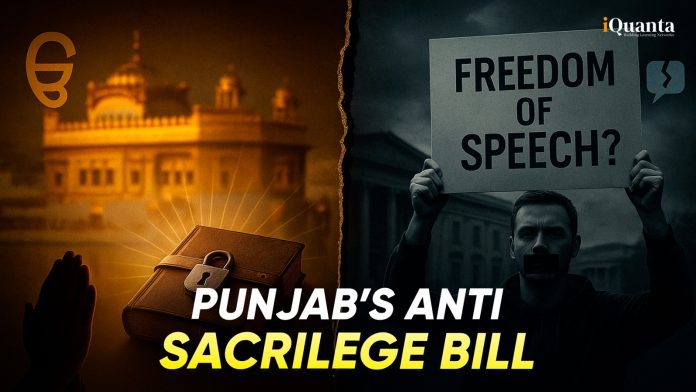Punjab’s CM Bhagwant Mann-led government proposed the Punjab Prevention of Offences Against Holy Scripture(s) Bill, 2025—toughened laws to punish sacrilege against books such as the Guru Granth Sahib, Quran, Bible, and Bhagavad Gita with 10 years to life imprisonment and ₹10 lakh fine. Critics, however, say it closely resembles extreme sacrilege laws—threats to free speech and due process. Let’s unfold how all these issues started and how it is currently affecting the state of Punjab and the Nation.

Key Events Happened
Before understanding the complete issue, you must know how things started to unfold in the first place:
| Date | Event Happened |
| April, July 2025 l | Repeated sacred protests, including the tower sit by Gurjeet Khalsa. |
| July 14, 2025 | The Punjab Cabinet finally approves the anti-sacrilege bill |
| July 15, 2025 | The law referred to a 15-member select committee. |
| July 19, 2025 | The Committee holds an inaugural meeting |
What does the Bill say?
The Bill stipulates that any act of disrespecting the sacred texts is a crime that can be punished with the following penalties:
- Ten years to life in prison and a fine of ₹5–10 lakh or three to five years in jail plus a fine for attempting or aiding and abetting.
- No parole for offences causing communal unrest.
- Fines of up to ₹20 lakh.
- Special provisions for religious leaders, such as pastors and granthis, also apply the harshest penalties to them.
The Bible, Quran, Guru Granth Sahib, and Bhagavad Gita are all protected, as are excerpts such as Gutkas and Pothis (Booklets).
The Justification served says that the following repeated incidents, such as the Bargari-Behbal Kalan desecration episodes, Mann deemed the bill essential to prevent emotional harm and maintain interfaith harmony.
What does the Government say?
According to CM Mann, the purpose of the Bill is to prevent emotional trauma in communities by protecting the “living Guru” (Guru Granth Sahib) and comparable sacred texts from grave violations.
- The state of Punjab says that since the Bharatiya Nyaya Sanhita says nothing about the desecration of scripture, state-level laws with specific rules and regulations are necessary for the security of religious communities.
- The pressure from the public Urgency was pushed by Gurjeet Singh Khalsa’s protest, which lasted 272 days atop a tower. His idealistic protest and invalid health status highlighted the need for action on this issue.
- Inderbir Singh Nijjar (AAP) led a 15-member bipartisan Select Committee that included Congress, BJP, and SAD MLAs. Speaker Kultar Sandhwan stated his intention to hold expert, religious, and public consultations.
Voices from Punjab
Supporters’ Response on the issue:
- Interfaith organisations and the AAP advocate for the law to prevent sacrilege and preserve communal harmony.
- The Bill was marked essential for the Punjabi community as a whole by Minister Tarunpreet Singh Sond.
- During meetings with the speaker and committee heads, representatives of the interfaith delegation urged expeditious passage.
Opponents’ Response on this:
- Congressman Amarinder Singh Raja Warring, who opposed the Bill, said it was political planning that delayed prosecution and diverted the voters.
- SAD said that in the 2015 cases involving leader Ram Rahim, neither the AAP nor the Congress applied true justice; instead, they used the matter for political gain.
- SAD demanded action on expanding the law to include idols and other religious symbols too, while BJP MLAs called for the previous sacrilege allegations.
Committee and Its Roles
MLAs from various political and religious parties, including the AAP, Congress, BJP, and SAD, as well as the Advocate General as an ex officio member, constructed the 15-member Select Committee, which is chaired by Dr. Inderbir Singh Nijjar, where weekly meetings were planned, and public feedback channels such as WhatsApp and email were, also it was recommended that Within six months, draft recommendations must be submitted.
They will confer with civil society organisations, legal experts on constitutional rights, religious bodies and clergy, and victims or relatives of previous sacrilege incidents.
The objectives of the committee are to clarify unclear clauses, guarantee safeguards against abuse, and strike a balance between civil liberties and enforcement.
Risk towards the Aspirants
Punjab’s long history of sacrilege incidents—including 2015 Guru Granth Sahib desecrations and 2021 lynchings—stoked public outrage. Advocates argue a strong law is overdue.
However, potential pitfalls include:
- Heightened vigilante actions based on unverified allegations.
- Use of religious clauses to intimidate dissenters, artists, and journalists.
- Legal overreach—imprisonment without clear procedural safeguards.
Law commentators emphasise that strong laws must include clarity on definitions, due process rights, appeal rights, and protection from mob misuse. Without these, enforcement may itself threaten the rule of law.
Join CLAT Course

FAQs
The Anti-Sacrilege says that any damage to any Indian scriptures and any associated item is a punishable offence under the proposed law. Only July 15, 2025, the draft of the bill was framed by the select committee of MLA’s which was chaired by Inderbir Singh Nijjar.
Any individual who violates the Anti-Sacrilege law may face 10 years of life imprisonment with a fine of 5-10 lakhs. In case of any violence, the penalty may rise to 20 years of imprisonment and 20 lakhs of penalty money with no parole eligibility.
Yes, Different versions of the same bill were tried to pass in previous years, but unfortunately, those bills were returned by the president, and this is the third attempt to pass the Anti-Sacrilege bill in the state of Punjab.




